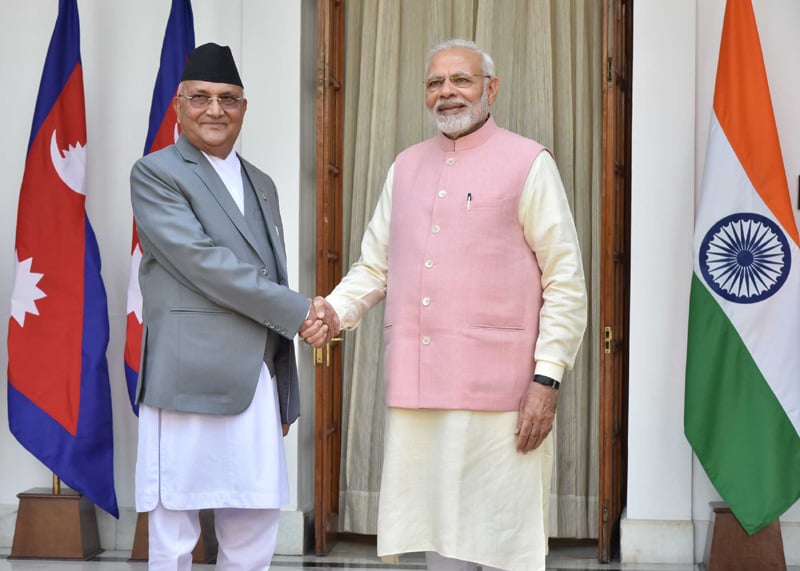Power of Neutrality Pays Off

Matrika Poudyal "Khariputra"
April 08, 2018

"Poor people cannot choose and unarmed people cannot defend themselves"
The statements above might not be verified with reliable sources though they sincerely speak the truth pertaining to the Nepalese foreign policy phenomena. Poorer countries are mostly in such circumstances in which they are more likely to be acting as neutral, trustworthy and compliant for making the bigger chunk of the benefits on their sides while dealing with the hostile contexts that usually happen to take place in the daily affairs of them.
The India visit of the Prime minister Khadga Prasad Oli is being intensively observed across the diplomatic arena as he represents a government of the majority. He and his delegates are, in fact, expected to act sincerely on every bilateral vital concerns—the larger section of the civil society has strong recommendation to act neutrally during the visit.
Because the power of neutrality and trustworthiness offer the weak nations the complete freedom and liberty for adopting their rightful choices for the required benefits of the countries. The same power of neutrality tenders the conducive environments to keep themselves from the unnecessary antagonism and the antipathy commotion among the stakeholders.
Poorer countries are mostly in such circumstances in which they are more likely to be acting as neutral, trustworthy and compliant for making the bigger chunk of the benefits on their sides while dealing with the hostile contexts that usually happen to take place in the daily affairs of them.
The policy of non-interference, in fact, emphasizes the weak nations' right of existence securing the total guarantee of the territorial integrity and sovereignty.
Nevertheless, they are disadvantaged in the global political-economic and cultural strengths. The demography is, of course, one of the chief elements contributing the degree of dominance on wide-ranging human affairs.
Therefore, they are obliged to compensate for size-related issues and strife for achieving the maximum political economic conveniences out of the relentlessly competitive contexts. As one my foreign friends and research scholars of international relations had put, "Nepal is a country of beauty and poverty".
Now I feel how Nepal has always been beauty having been poor. Actually, my friend had postulated about Nepal on the socio-economic grounds. If the society and the social affairs of the inhabitants of the place are not "developed" i.e. rich in best possible human dignity, integrity and cultural excellence, the country as well as her people are, truly, called poor. Maintaing the primary diplomatic protocol at the state visit is as important as maintaining the primary courtesy in the community life.
When the delegates to be departing for the foreign visit do not have or are short of the basic and unexceptional norms of the citizens of a civilized nation, neither the delegates nor the country they represent receive the dignified civility of any kind. The honor of the highest grade will only be offered if the recipient is the person worthwhile.
The glossy press statements and the grandiloquence of the richer, more powerful and strategically stronger nations, as a matter of fact, can never become friend in need to the poorer nations.
For instance, when a country becomes stronger militarily as well as financially, the first and foremost act of her will be expanding the sphere of influence in the surrounding region in order to establish a regional stability. Principally, the hegemonic power is mostly responsible for generating socio-political and economic abundance which, in turn, makes the weaker states more dependent than earlier so that the stronger ones can easily manipulate the existence of the weaker ones. Then, gradually, the hegemons gain control over them and, ultimately, impose the suzerainty over them.
For that, the hegemonic power must be stronger and consistently bear the brunt of being a hegemon. The concerned state or group of state can no longer enkindle the desired regional stability without the well-guarded comprehensive peace. The most sought after peace and stability is always solely for the growth of the economic and military power of the stronger states. They use varied options, socio-cultural, political-military and, sometimes, harsh measures to make that stability happen. The hegemons chiefly concentrate on extracting the resources of any kind profuse in the least developed countries like Nepal. The Indian foreign policy towards Nepal has been direct and coherent-- conveniently gain control over the rivers, the minerals and the entire Himalayas of Nepal.
The regional powers across the world hold mostly the common syndroms; India can not be an exception i.e. she also streneously tries to fulfill her hunger insatiable for natural resources fueling the economic growth machines. On top of that, at the Asia-Pacific region, India has not been in good term with China, Pakistan, and to certain extent, Bangladesh including the countries which are excessive benefactors of Pakistan.
In this regard, the poorer states, since they do not possess many options, without any hesitation, must assume the soft power or, in the modern era, the multiple options of diplomacy—the power of neutrality, at most. Since, the poorer the neighbouring countries, the easier it will be for the regional hagemon for tightening the clutches. However, the paradigms of the bilateral relations will be dramatically altered as the weaker states grow in economic and military strengths.
Thus, the weaker nations can only preserve their present and future through the sincere implications of their power of diplomacy by the experienced diplomats and the geopolitians with extraordinary skills. Have Nepal and her statesmen been sincere and up to the level of needed integrity as for safeguarding the destiny of the people and their posterity? This is the strategic question of present Nepalese foreign policy pattern.


Leave Comment